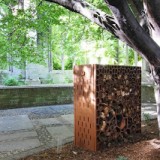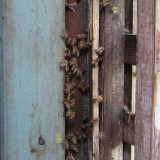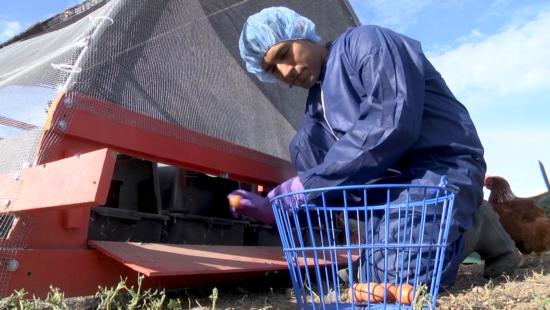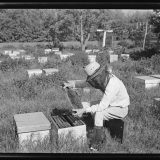
Log hive.
This was the provocative question radical “apiculturlist” Michael Thiele posed at the beginning of his lecture at this year’s Heirloom Expo in Santa Rosa.
Thiele pointed out that bees:
- Maintain a hive temperature of around 94°F/35°C
- Have a low number of offspring, if you consider a swarm to be their offspring
- Are nurtured by mother’s “milk” (technically sister’s milk)
These are all characteristics of mammals. Thiele inspiration is a book The Buzz about Bees: Biology of a Superorganism, by Jürgen Tautz who calls bees,”the mammal in a thousand bodies.”

Golden Hive.
Thiele’s next point was that if we think of them as a mammal than we’re going to have a different relationship with them. Practically, this might mean different housing. If a bee is a mammal what they live in becomes their skin and fur. To keep their hive temperature steady they need insulation, both in warm and cold climates. He suggested that the standard Langstroth box is too thin. Maybe they’d be happier in the two hives Thiele had on display, a hollowed out log or the insulated Golden Hive box (which had movable frames).
Thiele’s talk took a metaphysical turn when he said that we need to “go beyond the left brain” in our relationship with bees. He also, provocatively, suggested that we need to “know ourselves” before approaching bees. I took this to mean understanding our intentions, our goals, and our attitudes.
Back to housing. Langstroth was very much the product of a “left brain” industrial age whose point was the domination of nature. Given the problem bees are having, perhaps it’s time to strike a balance between the intuitive and analytical and, literally and figuratively, think out of the box.




Interestingly, “bee” in the Holy Tongue is “devora” from the word “dvar,” meaning “word.”
Humans are called “medaber,” speaker, (from the same root) because of our unique ability among the creatures to speak and thus reveal our intellect to one another.
I wonder: Do the bees — “devorim” — also speak among themselves?
That is so cool. Thank you.
I suppose a person could prove anything with a few stretches. At first, I thought this was a tongue in cheek proposition until the end. No, a bee is not a mammal. There are quite a few other mammalian characteristics bees do no possess.
That log hive is magnificent.
absolutely not a mammal. no vertebrae, they have an exoskeleton. and most importantly they are insects. come on Root Simple, most people who read this site would have a fairly good understanding of biology. this kind of article is best left to Fox news or its ilk. bees are wonderful creatures, and there is a lot we still need to learn about them. science before fantasy please.
If you redefine ‘body’, ‘offspring’ and ‘milk’ you can stretch the point to breaking and STILL fail to prove that bees are mammals….
How about instead we redefine our relationship to bees based on what they actually are instead of some bizarre romanticised idea that is utterly inaccurate?
They don’t have to be mammals to have a preferred temperature range and require thicker hive walls….
I want to emphasize that I’m speaking metaphorically not literally here–perhaps I didn’t make that clear in the post. Thiele and Tautz (who is a zoology professor, incidentally) are also speaking metaphorically. As super-organisms, honeybees, ants and termites are very different than other insects.
No.
I recognize the rhetorical and metaphorical nature of the question and I see a better, non-rhetorical question: Are these similarities between bees and mammals an example of convergent evolution? (see http://en.wikipedia.org/wiki/Convergent_evolution)
So are bees mammals